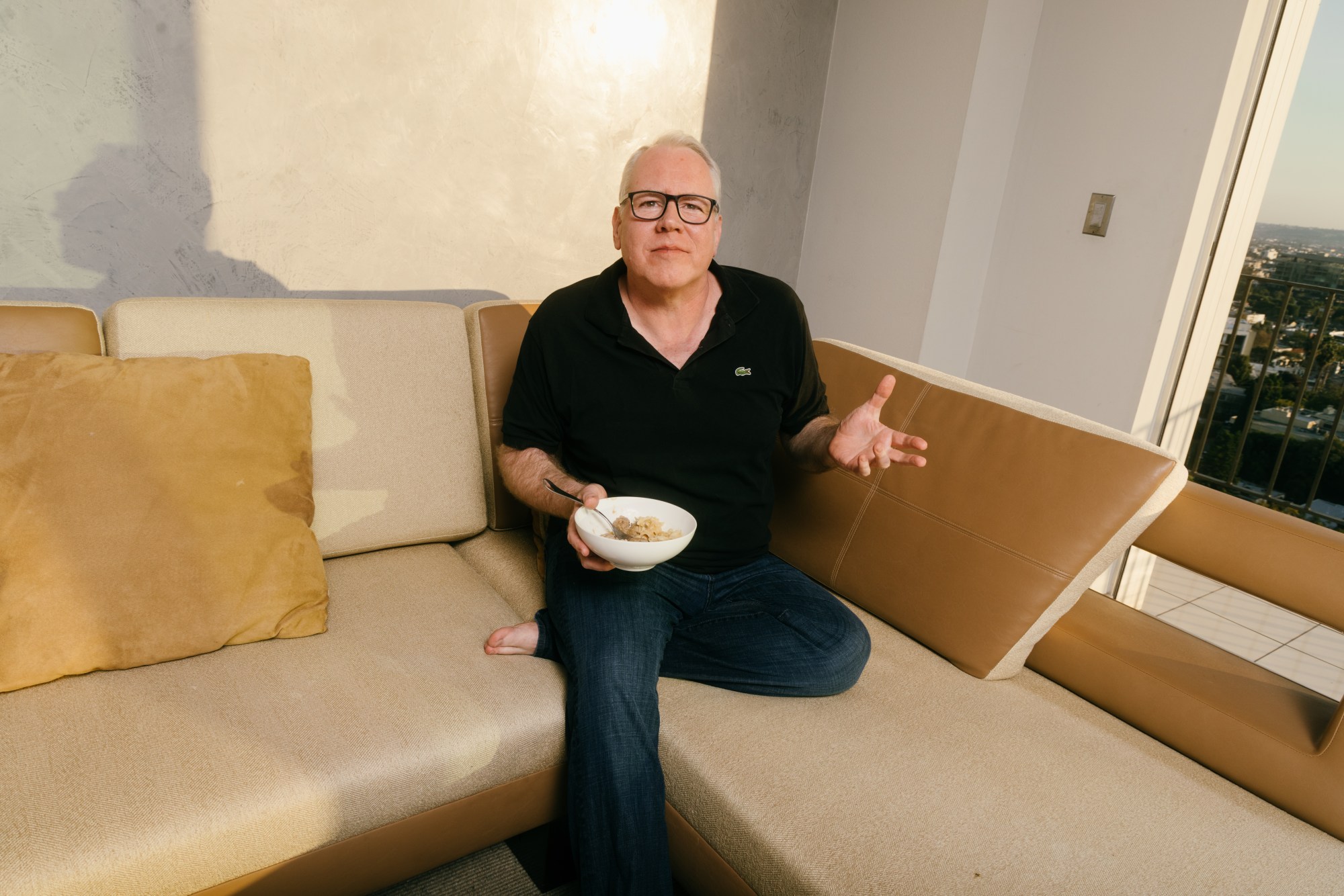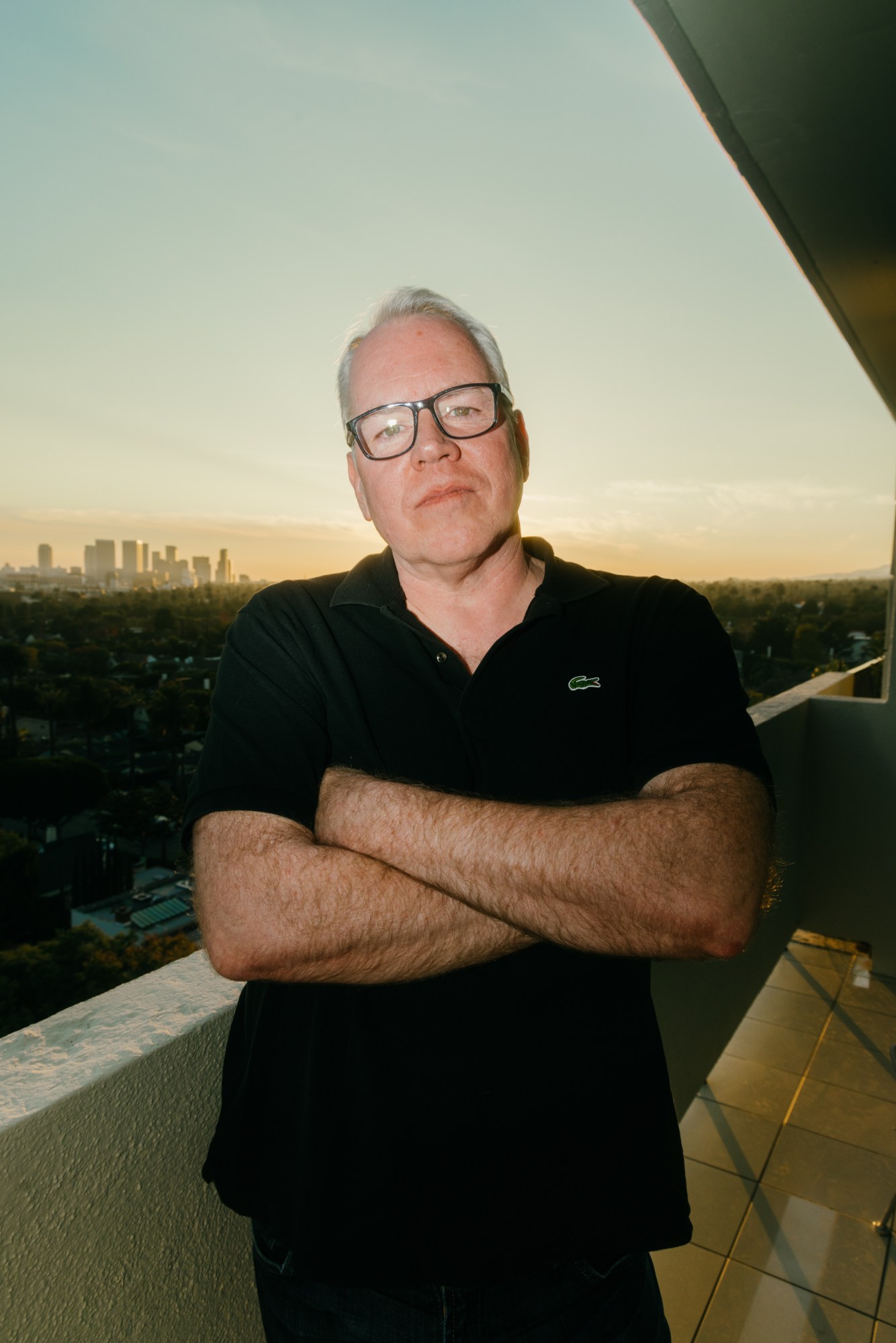Bret Easton Ellis doesn’t want to talk to me. He’s started declining interviews now. I can hardly blame him. “I just can’t do them anymore,” he says over Zoom, from his office in Los Angeles. “I’m old and cranky! I’m sorry, what more do I have to say!?” Naturally, Bret Easton Ellis has a lot more to say.
The LA native, now in his late 50s, has a reputation that far proceeds him. Once a great enfant terrible novelist, Bret has spent much of the last decade donning the guise of a troll. Who could forget the interview with Channel 4 News where he stated that he probably gets more flack on Twitter than Black women? Or when he did an interview with the Paris Review and stated: “I wasn’t a misogynist when I wrote [American Psycho], but the unearned feminist hysteria briefly turned me into one”?
Bret has said so much insane shit over the years that he could easily fill a book, which is exactly what he did with White, a 2019 diatribe against political correctness in which he refers to millenials as “Generation Wuss” and extols the shake-up to the political landscape brought on by Donald Trump. The problem of Bret Easton Ellis is a hard one to grapple with. We have this man, who is undoubtedly one of the greatest living American novelists, someone who has defined popular culture as much as he has influenced it, and no matter how much goodwill you have for him, he’ll always end up making you look like a fool for supporting him. It’s the closest I’ve ever come to following a football team.

Bret doesn’t care about any of this, obviously. “If people don’t like me, so be it. I have no interest at all in correcting them,” he tells me as he sits in front of a blank grey wall, wearing a simple black T-shirt and reading glasses. I’m talking to him a couple weeks before the physical publication of his first novel in 13 years, The Shards. I make a point of the physical publication for a reason, the book has actually been out for over a year now, existing as a serialised podcast that Bret released between September 2020 and September 2021. Every two weeks, Bret would read another chapter of The Shards as he was writing it. Serialisation is nothing new (it’s basically how every novel during the Victorian period was released) but Bret’s approach does feel like a particularly ingenious way of disrupting the contemporary publishing model.
“The patience required to write a novel, wait for it to be published, and then to get readers, is just an antiquated system of getting information out to people. I think we live in a time where it just doesn’t seem to make much sense.” So why not just publish it as you write it? Bret goes on: “I had no middleman, no agent, no editor, and I still made pretty good money.” When it came to actually publishing The Shards, however, Bret still had to play by the rules of the old system. Knopf, his American publisher, told him that it would be about 14 months before the book could be published, despite the fact the entire thing was written and available to listen, in full, online. “I was like, well, fuck, okay, why even bother?!”
The Shards, in its current print iteration, is a triumphant return to form for Bret. There is a sense that he very much had a lot to live up to after the past decade of poorly-received screenplays and anti-PC tirades – and thankfully, he has delivered in abundance. It doesn’t seem surprising when he tells me he’s been working on this novel for 40 years. “I was going to write it in 1982. I had started Less Than Zero and then The Shards took over very briefly.” He had the story of The Shards down pat since those early writing sessions in 1982. However, there was something in him that never quite allowed him to write the novel just yet. “I kept coming back to The Shards every eight years or so, or after I had finished a book.” Haunted by the idea for four decades, Bret suddenly found himself at home with nothing much to do early in the pandemic, and a late-night doomscroll finally led him to getting The Shards on paper.
“I was going online and I started looking for classmates that I had started to think about and I couldn’t find them.” One thing led to another, and Bret became almost obsessive over this search for his former schoolmates. “I wanted so badly to find out what was going on in their lives, what was happening to them, and then I started thinking about the last year of high school. Then I started listening to all the music from that year. I started looking for all the places where we hung out (they’re all gone). I had a profound wave of nostalgia for that time. I started writing the book that night, and the next day I had 14 pages. It happened very quickly.”
The Shards is something of an outlier in Bret’s bibliography. Up until this point, all of Bret’s novels have been interconnected in some way. Often characters will appear over a couple novels – such as Clay, the main character of Less Than Zero, appearing briefly in The Rules of Attraction – or how one of the narrators of Rules is Sean Bateman, the younger brother of American Psycho’s Patrick. The Shards doesn’t have any of this. It’s about Bret and his friends in their final year of high school and what happens when a serial killer known as the Trawler begins to stalk their friend group. In terms of chronology, Bret sees this novel as the very beginning. “It’s the first one, it’s the origin story. If you’re going to read my books, and you want to read them in order, you start with The Shards.”
SUBSCRIBE TO I-D NEWSFLASH. A WEEKLY NEWSLETTER DELIVERED TO YOUR INBOX ON FRIDAYS.
It is impossible to talk to Bret without broaching the subject of American Psycho. The novel, about a 27-year-old investment banker named Patrick Bateman whose psychopathy leads him to committing a string of violent and sadistic murders, courted immense controversy when it was released in the early 1990s. “I remember, I was in a hotel room, and I ordered room service. I turned on the TV and immediately went to CNN, and Gloria Steinem was being interviewed about American Psycho.” It was on CNN that Steinem publicly denounced the novel and called for its boycott. All of this, of course, only helped the novel sell more copies. It is, by far, Bret’s most popular and influential work.
Of course, Bret isn’t so sure if the novel could have been published today: “We seem to be in a very literal minded era where people don’t see metaphor as much as perhaps they used to. There’s a lot less freedom to express yourself as an artist, it’s really scary. I am sure there is stuff out there as bad as American Psycho, but [it’s] just not being published by mainstream press.” Despite his feeling that American Psycho wouldn’t have seen publication in today’s political climate, it has been reprinted over 50 times and sold over one million copies.
It’s hard to believe that such a huge, public backlash didn’t have an effect on Bret. Did it alter who he was as a writer? “I would say writing American Psycho changed me, certainly. I worked on it from age 23 to 26 – I grew up writing that book. But in terms of the reaction to it and what people were saying about it at the time, I was at a distance, I was at a remove, as I always am. If anything, it just made me tougher and more resistant to reactions and criticism.”

Our conversation moves away from books and, strangely, settles on Lydia Tár, fictional star of the film TÁR, about a world-renowned conductor who is revealed to be a serial abuser and may or may not be responsible for the suicide of one of her mentees. Bret wasn’t a fan of TÁR, but he admits he is a fan of Lydia herself. “What was really interesting about TÁR,” Bret says, as I brace myself for where this is going to go, “is that her behaviour in that movie and the things she did, for her generation, that’s what you did!”
For anyone who’s seen the film, this is quite the statement to make: to watch TÁR and leave the theatre thinking “Lydia Tár did what she had to do” is really up there in terms of the most buckwild takeaways from that film. But, at almost an hour into our interview, Bret is becoming noticeably more blasé and irascible, and whether he actually believes any of this seems questionable.
As our conversation ends and Bret hangs up, I’m left somewhat at a loss. I feel more confused about the man than I did before, if anything. Is Bret just as distant and vacant as the protagonists of his novels, or is he simply a great showman, playing up the character of Bret Easton Ellis? As I always do, I’m going to give him the benefit of the doubt. As the author himself wrote in Lunar Park, “No one said being a Bret Easton Ellis fan was easy.”
Credits
Photography Michael Tyrone Delaney
